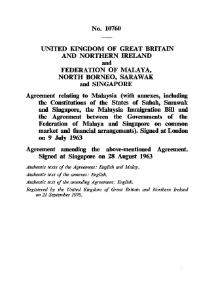Malaysia Agreement
| Agreement relating to Malaysia between United Kingdom of Great Britain and Northern Ireland, Federation of Malaya, North Borneo, Sarawak and Singapore | |
|---|---|

Agreement relating to Malaysia
|
|
| Drafted | 15 November 1961 |
| Signed | 9 July 1963 |
| Location | London, United Kingdom |
| Sealed | 31 July 1963 |
| Effective | 16 September 1963 |
| Signatories | Government of United Kingdom Government of Malaya Government of North Borneo Government of Sarawak, and Government of Singapore |
| Parties |
|
| Depositary |
British Government dated 21 September 1970 The Secretary-General of the (English), (French), and (Malay) Registered Nr. I-10760 |
| Languages | English and Malay |
|
|
|
The Malaysia Agreement or the Agreement relating to Malaysia between United Kingdom of Great Britain and Northern Ireland, Federation of Malaya, North Borneo, Sarawak and Singapore was the agreement which combined North Borneo, Sarawak, and Singapore with the existing states of the Federation of Malaya, the resulting union being named Malaysia. Singapore later ceased to be a part of Malaysia, becoming an independent state on 9 August 1965.
The Malayan Union was established by the British Malaya and comprised the Federated Malay States of Perak, Selangor, Negeri Sembilan, Pahang; the Unfederated Malay States of Kedah, Perlis, Kelantan, Terengganu, Johor; and the Straits Settlements of Penang and Malacca. It came into being in 1946, through a series of agreements between the United Kingdom and Malayan Union. The Malayan Union was superseded by the Federation of Malaya on 1 February 1948, and achieved independence within the Commonwealth of Nations on 31 August 1957.
After the end of the Second World War, decolonisation became the societal goal of the peoples under colonial regimes aspiring to achieve self-determination hereinafter, the Special Committee on Decolonisation (also known as the U.N. Special Committee of the 24 on Decolonisation, It reflected in the United Nations General Assembly's proclamation on 14 December 1960 of the Declaration on the Granting of Independence to Colonial Countries and Peoples hereinafter, the Committee of 24, or simply, the Decolonisation Committee) was established in 1961 by the General Assembly of the United Nations with the purpose of monitoring implementation of the Declaration on the Granting of Independence to Colonial Countries and Peoples and to make recommendations on its application. The committee is also a successor to the former Committee on Information from Non-Self-Governing Territories. Hoping to speed the progress of decolonisation, the General Assembly had adopted in 1960 the , also known as the "Declaration on the Granting of Independence to Colonial Countries and Peoples" or simply "Declaration on Decolonisation". It stated that all people have a right to self-determination and proclaimed that colonialism should be brought to a speedy and unconditional end.
...
Wikipedia
